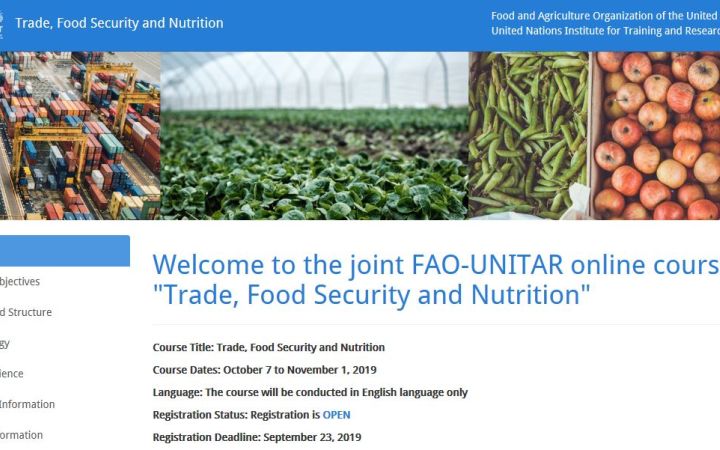19 June 2019, Geneva, Switzerland - UNITAR and the Food and Agriculture Organization of the United Nations (FAO) recently signed a new agreement to launch a joint online course on Trade, Food Security and Nutrition to be delivered in English language for Sub-Saharan African countries.
This course is designed to assist representatives from government and related authorities, who are directly involved in the formulation and implementation of agricultural policies and programmes in Sub-Saharan Africa. These includes officials from Ministries of Agriculture, Livestock, Fisheries; Ministries of Trade, Commerce, Industry; Ministries of Finance, Economy; and Food Safety, Sanitary, Phytosanitary, Veterinary and other authorities. Participants from regional and international organizations, the private sector and academia can also benefit from the course.
In the preparation of this course, FAO draws from its extensive experience with providing guidance and technical advice to its member countries on the topic of trade and food security, agricultural trade policy and multilateral trade negotiations, as well as its normative work on the SPS issues.
UNITAR’s alumni network, online training infrastructure, and expertise in delivering web-based training will be leveraged in the delivery of this course.
By the end of the course, participants will be able to assess the challenges and opportunities posed by greater openness to trade for food security and nutrition, describe different types of trade policy measures and considerations for trade policy design and implementation as well as discussing the key global policy and regulatory frameworks governing trade, food security and nutrition, including the WTO Agreement on Agriculture and Agenda 2030.
COMMITMENT TO BOOST INTRA-AFRICAN TRADE IN AGRICULTURAL COMMODITIES AND SERVICES
Through the 2014 Malabo Declaration, African governments made a specific and clear commitment to boosting intra-African trade in agricultural commodities and services, and to harnessing market and trade opportunities locally, regionally, and internationally. This is increasingly regarded as a means to promote agricultural transformation in sub-Saharan Africa, since it can help address the key challenges to agricultural development in the region such as diverse agro-ecological systems, and small national markets.
In this context, the relationship between trade and food security is attracting increased attention on both the trade and the development agendas. The eradication of global hunger by 2030 is a key goal in the new 2030 Agenda for Sustainable Development, and trade is recognized as one of the means for achieving the SDGs. The challenge is how to ensure that the expansion of agricultural trade works for and not against, the elimination of hunger, food insecurity and malnutrition. This challenge has been at the forefront as governments’ struggle to negotiate the changes to the current global agreements on agricultural trade that are needed to ensure that trade results in enhanced food security.
The increasing need for trade experts to support trade related development agenda in the region has posed a major challenge. In most cases, national and regional institutions do not have the technical capacity and resources to map out national, sub-regional and regional level trade priorities and constraints; to empirically assess the implications of their multiple memberships on trade, food security and nutrition; to formulate appropriate mitigation policies and strategies; or to negotiate trade agreements that boost gains from trade and specialization.
This course therefore seeks to strengthen capacities in Sub-Saharan Africa, to develop and implement evidence-based trade policies, and to formulate and negotiate trade agreements, taking into consideration both their needs for economic growth and structural transformation, as well as their food security and nutrition concerns.
REGISTER NOW, LIMITED SLOTS ARE AVAILABLE
This course will be organized in three units and conducted in English over a period of four weeks. This course will be delivered online via UNITAR’s e-learning platform and will take place from 7 October to 1 November 2019.
Limited slots are available in this course and will be subject to a selection process conducted by FAO and UNITAR, taking into account in particular, the geographical distribution and gender balance.
A certificate of completion will be issued to participants who successfully complete all course-related assignments and assessments.
For more information and online registration, please visit UNITAR’s website at: www.unitar.org/tfsn. Registration deadline is 23 September 2019 or while slots are available. Please register early.
Over the past six years, UNITAR's collaboration with FAO has continued to grow with over a dozen of agriculture and trade-related courses developed and delivered for the benefit of over 1000 beneficiaries globally with a large part coming from Africa and Central Asia.
ABOUT FAO
FAO is a specialized agency of the United Nations that leads international efforts to defeat hunger. The goal is to achieve food security for all and make sure that people have regular access to enough high-quality food to lead active and healthy lives. With over 194-member states, FAO works in over 130 countries worldwide. For more information, visit www.fao.org


